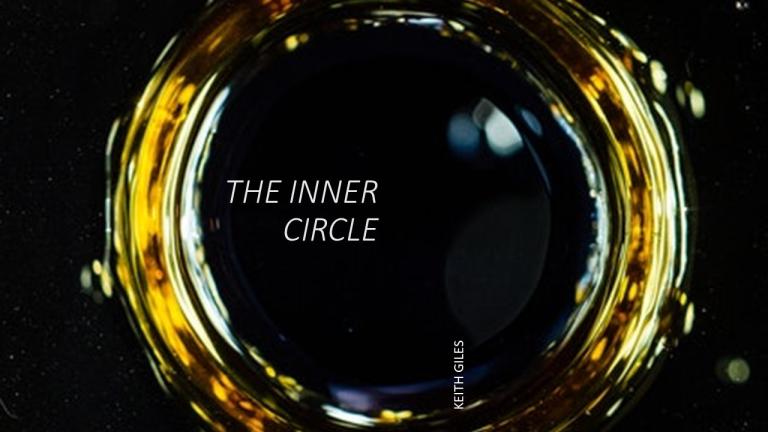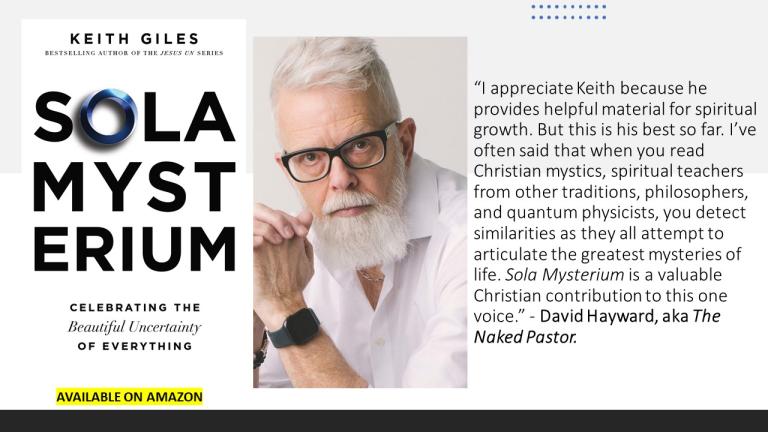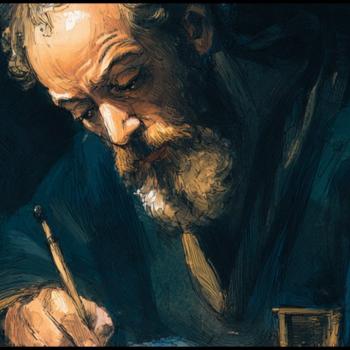
Saying 13, “Jesus said to his disciples, “Compare me to someone and tell me who I am like.” Simon Peter said to him, “You are like a righteous angel.” Matthew said to him, “You are like a wise philosopher.” Thomas said to him, “Master, I am wholly incapable of saying whom you are like.” Jesus said, “I am not your Master. Because you have drunk, you have become intoxicated from the bubbling spring which I have measured out.”
And Jesus took him and withdrew and told him three words. When Thomas returned to his companions, they asked him, “What did Jesus say to you?” Thomas said to them, “If I tell you even one of the things he told me, you will pick up stones and throw them at me; a fire will come out of the stones and burn you up.”
There are some scholars who question the authenticity of the second half of this saying since it is technically not a saying of Jesus at all, in that we do not get to hear what Jesus supposedly said to Thomas in private.
For now, let’s take a look at the first half which does appear to include a saying of Jesus in response to a question he asked his disciples. The question Jesus poses to his followers is, “Compare me to someone and tell me who I am like.” Only 3 of his disciples respond and each one of them misses the mark in some way.
First, Peter compares Jesus to a “righteous angel.” The term “righteous” is the same as the one used in the previous saying to describe James the Righteous. In other words, Jesus is just, and wise, and, like James, a messenger approved by God. But, Jesus offers no response to Peter’s affirmation, suggesting that his reply isn’t quite right.
Second, Matthew compares Jesus to “a wise philosopher,” which would put him in the same category as Plato or Socrates. Again, Jesus does not seem to agree or disagree, but his silence suggests that, like Peter, Matthew hasn’t quite given the answer Jesus was hoping for.
Thomas offers our final comparison, and while we might assume that Thomas would, of course, give the correct answer – since he’s the author of this collection of sayings – even he seems to fail this test by saying, “Master, I am wholly incapable of saying whom you are like.”
What Jesus takes exception to is the suggestion that Jesus is their master or teacher. His response to Thomas is to point out that he has become intoxicated by the revelations Jesus provided to them, and this has confused his mind to believe that Jesus is somehow “other” than himself.
In other words, if Thomas had truly understood the message Jesus was sharing with them, he would have known that there could never be any separation between any of them, and that Thomas did not require a Master or a Teacher to know the Truth – because the Truth was already alive within him, and everyone else.
Still, seemingly because his response was nearer to what Jesus was hoping for, Thomas is invited to come away with Jesus to receive “three words” – or statements – that the others are not privy to.
This is the section that some find troublesome, for the simple reason that it is more of a narrative and it contains no actual “sayings” of Jesus. At least, none that we can hear.
Or, maybe we can? Because the very next saying of Jesus in this Gospel of Thomas contains three sayings which could feasibly be taken as the same three words Jesus whispers to Thomas in this saying. Especially since that next saying begins with “Jesus said…” and doesn’t mention any other disciples specifically in his audience as this one does.
Either way, it is unusual for Thomas – or any other disciple of Jesus – to speak in this Gospel, and when what is spoken here is an admission of the heretical nature of Jesus’s teachings, one may wonder whether this second paragraph might have been added by someone seeking to discredit the words of Jesus found in this book.
In other words, why would Thomas admit that what Jesus said to him is worthy of being stoned to death by Jesus’s own disciples? It’s not the Pharisees or the Jewish authorities who are said to seek to stone Thomas for repeating what Jesus said to him, it’s Peter and Matthew and the other disciples. This sets Thomas, and the Jesus we meet in his Gospel, far apart from those Apostolic figures, and, presumably, from the rest of what eventually became Orthodox Christianity.
On the one hand, this could simply be an admission of the tension between these two contrasting factions within Christianity at this time – a chasm that would only deepen and widen over the successive centuries – but on the other hand, it could very well be a subversive addition to this text which is intended to cast doubt on what we read in this very Gospel.
We should also mention something about what Jesus says to Thomas in the first saying at the top about how he has “…become intoxicated from the bubbling spring which [Jesus has] measured out.”
This metaphor of a bubbling spring is tantalizingly close to the proclamation Jesus makes on the last day of the Feast of Booths in John 7:37-38:
“If anyone thirsts, let him come to me and drink. Whoever believes in me, as the Scripture has said, ‘Out of his heart will flow rivers of living water.’”
It also calls to mind the startling promise Jesus gives to the Samaritan woman at the well in John 4:13-14:
“Everyone who drinks this water will be thirsty again, but whoever drinks the water I give them will never thirst. Indeed, the water I give them will become in them a spring of water welling up to eternal life.”
In each case, Jesus speaks of a river, or a spring of water that wells up within his disciples, or that flows out of their hearts, to give them life, and joy, and refreshment.
Here, Jesus mentions to Thomas that this “bubbling spring” has intoxicated him so much that he has forgotten that the source of the living water within him is not Jesus. In other words, he does not need to come to Jesus for this water, or for life, or for wisdom, or joy, or anything else. The water spontaneously flows out from within Thomas, and all of us. All Jesus has done is to reveal it within us; he has pointed it out, and now we can freely come and drink from this inner well whenever we want.
So, now that we have this river and bubbling spring of living water within us, we do not need a Master to continually give us water, or life, or joy, or wisdom, because each of us now has continuous access to the water of life that flows within us.
This is a difficult concept for many of us who have been conditioned, or programmed, by our spiritual guides and teachers, to exceptionalize Jesus and downplay ourselves. “He must increase and we must decrease,” we are taught to say, in tandem with the words of John the Baptist. But, when we do so, we ignore the words of Jesus who told us that we would do even greater things than he did because the same living Spirit of God that raised Jesus from the dead now resides within us. [See Romans 8:11 and John 14:12-14]
Let’s not become distracted in this saying by what Jesus did not say out loud. Let’s focus instead on the beautiful words he does speak to Thomas in the first half of the saying:
“I am not your Master. Because you have drunk, you have become intoxicated from the bubbling spring which I have measured out.”
You and I do not require Masters or Gurus to lead us around by the hand, or the head, or the heart. Christ has opened up a spring of intoxicating water, a river of life, and a well of endless living water deep within.
Drink deep. Be refreshed.
NOTES: As one unknown commenter said of this passage, “All things imply their negation. This is not that. The One has no negations. It is All. Can you describe what All is like? Neither could Thomas.”
- F. Bruce writes: “This conversation begins like that at Caesarea Philippi, recorded in all three Synoptic Gospels, where Jesus asks his disciples ‘Who do men say that I am?’ and then: ‘But who do you say that I am?’ (Mark 8.27-29). But the answers given here are quite different from what we find in the canonical tradition, which is consistent with the historical circumstances of Jesus’s ministry. Here the answers are attempts to depict Jesus as the Gnostic Revealer. Those who have imbibed the gnosiswhich he imparts (the ‘bubbling spring’ which he has spread abroad) are not his servants but his friends, [Cf. John 15.14] and therefore ‘Master’ is an unsuitable title for them to give him. As for the three words spoken secretly to Thomas, conveying Jesus’s hidden identity, they are probably the three secret words on which, according to the Naassenes, the existence of the world depended: Kaulakau, Saulasau, Zeesar. [Hippolytus, Refutationv.8.4. Kaulakau, they said, was Adamas, primal man, ‘the being who is on high’ . . . Saulasau, mortal man here below; Zeesar, the Jordan which flows upward.] (In fact, these three words are corruptions of the Hebrew phrases in Isaiah 28.10, 13, translated ‘Line upon line, precept upon precept, there a little’ – but their origin was probably forgotten.) The followers of the Gnostic Basilides are said to have taught that Jesus descended ‘in the name of Kaulakau‘. [Irenaeus, Heresies i.24.6.] The fire that would come out of the stones is perhaps the fire of Saying 10. There is in any case ample attestation of the belief that the untimely divulging of a holy mystery can be as destructive as fire.” (Jesus and Christian Origins Outside the New Testament, pp. 118-119)
**

My new book, SOLA MYSTERIUM: Celebrating the Beautiful Uncertainty of Everything is available NOW on Amazon in Print and on Kindle.
**
Keith Giles is the author of the 7-part best-selling Jesus Un book series from Quoir Publishing. Keith is also the host of Second Cup with Keith [a new solo podcast available now on the Ethos Radio App, for Apple and Android and on Spotify; and the Heretic Happy Hour Podcast, and the new Apostate’s Anonymous podcast with Matthew Distefano.













